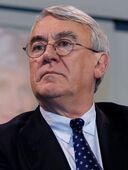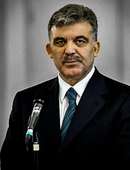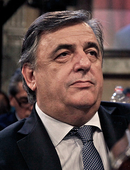Corrective Revolution (Carloso): Difference between revisions
No edit summary |
|||
| Line 65: | Line 65: | ||
==Timeline of events== | ==Timeline of events== | ||
===The referendum announced=== | |||
{{Gallery | {{Gallery | ||
|title=Notable opponents to the Referendum | |title=Notable opponents to the Referendum | ||
Revision as of 00:52, 16 April 2023
This article is incomplete because it is pending further input from participants, or it is a work-in-progress by one author. Please comment on this article's talk page to share your input, comments and questions. Note: To contribute to this article, you may need to seek help from the author(s) of this page. |
| Corrective Revolution | |||
|---|---|---|---|
| Part of the Musgorocian Autumn | |||
 | |||
| Location | |||
| Goals |
| ||
| Methods |
| ||
| Resulted in | Military intervene and put President Irisar under house arrest | ||
| Parties to the civil conflict | |||
| |||
| Lead figures | |||
| Number | |||
| |||
The Corrective Revolution (Carlosian: TBD) was a period of grave civil conflict and general political unrest that occurred in the months leading up to the 2010 Carlosian general election. Though it is still debated when exactly the Corrective Revolution began, most analysts agree that it was the wave of protests which took place on 23 August 2010 against the Conservative–Democratic coalition's plans to hold a referendum on the Constitution of Carloso's total ban on abortion. It is widely agreed that the Corrective Revolution had a profound effect on Carlosian political and civil life, directly responsible for what has been widely regarded as the greatest electoral shock in Carlosian history.
Mass defections and popular uproar over President Irisar's handling of the demonstrations crippled the Conservatives and resulted in the decimation of the two dominant parties; the centre-right Conservatives and centrist Democrats, who had both dominated Carlosian politics since the late 19th century. National Salvation came several seats short of a majority in the 2010 election, but managed to enter a coalition with the newly formed Rural Independents Group and form a government. Spalding declined to be nominated President, resulting in Tobón being chosen instead.
Background
Democratic-led government
Following the 2000 general election, the Conservative Party, led by President Adam Spalding, lost its majority in the National Assembly. Michael Gallagher, leader of the Democratic Party, seized the oppurtunity and set about building a rainbow coalition with several smaller parties; the Socalist Republicans, Progressive Conservatives and Green Alternative, to unseat Spalding and end 35 years of continous Conservative rule in Carloso. Shortly after Gallagher was elected President, Spalding was defeated in a leadership challenge by Montero Irisar. Unlike Spalding, Irisar was precieved as being much more socially and economically liberal, breaking from the Conservative tradition of Carlosian nationalism and staunch traditionalism in social matters. His victory marked the beginnings of a rift within the party, especially between Irisar's centrists and the new generation of only recently elected, ambitious National Assemblymen; such as Cárlos Tobón and George Spalding, who were characterised by their staunch anti-communism and ultranationalist outlook. Not long after entering government, the new coalition published a document setting out a programme of social reforms, including plans to completely abolish the restrictive regulations on the sale of contraceptives, legalise same-sex civil partnerships and abolish the near-zero immigration cap. Additionally, a plan of massive financial deregulation was drawn up, calling for the privatisation of large swathes of state-owned enterprises, such as the electricity network, railways and airlines. The coalition agreed to demands by Green Alternative to introduce a carbon tax and increase duties on petrol and diesel.
From its inception, the governing Democratic-led coalition proved volatile at best. The plans to deregulate large sectors of the economy immediately sparked disquiet within the Socialist Republicans, who had been quite happy to maintain the status quo. An attempt in late 2001 to have the party leader Isador Eguren unseated failed, and the Socialist Republicans remained part of the coalition.
2005 general election
Government formation
Timeline of events
The referendum announced
Plans for the referendum hit an unexpected road block when the Carlosian High Court ruled on the Q v. Cochrane case. Q, the plaintiff, had been born with various physical disabilities after a violent assault by the defendant on their mother while they were in utero. Under tort law, Q claimed D£500,000 in damages from the defendant. The matter was brought before the High Court, with the sitting judge ruling that unborn children enjoy the exact same legal protection as a human, regardless of the 19th Amendment, citing various case law examples during the judgement and awarding the damages. The Conservative–Democratic government now feared that repealing the amendment would be pointless as the unborn would still be protected, regardless of whether the article was repealed or not. The Attorney General decided to appeal the ruling to the Supreme Court, beginning the landmark Attorney General v. Q case.
Initial protests
Pro-abortion demonstrators protested outside the High Court in Madrigal as the deliberations concluded. The High Court judge issued an order for the protesters to disperse, reasoning that the anonymity of Q was under threat. The 300 or so strong group refused to disperse, and the Madrigal Metropolitan Police Service corralled and arrested all of them on the grounds of contempt of court. Though the case had finished, the arrests led to over 4,500 pro-abortion demonstrators to protest outside the High Court. They eventually dispersed peacefully.
Escalation
As the date for the beginning of Supreme Court proceedings on Attorney General v. Q drew nearer, the pro and anti-abortion movements were galvanised into mass action. Tens of thousands were drawn to the streets outside the Supreme Court in Madrigal. The police tried to keep the two groups separate, trying to avoid any escalation into violence. The Supreme Court was scheduled to make a ruling on 5 September 2010. Madrigal City Centre was practically shut down for several weeks as the case continued. Meanwhile, Tobón and his allies in the Conservative Party met in secret and discussed what their next move would be if the Supreme Court ruled in favour of the government and the referendum went ahead.
Storming of the Supreme Court building
– Muruaga de Hinostroza
On 5 September 2010, the Supreme Court ruled 7-2 in favour of the government, overruling the decision of the High Court and declaring that the right to life of the unborn did not extend beyond the 19th Amendment. Dissenting Justice Muruaga de Hinostroza shockingly denounced his colleagues in his own oral judgement, resigning from his seat in the Supreme Court. Almost immediately, violence broke out outside between the pro and anti-abortion supporters, completely overwhelming the police. It is unknown who started it, but people managed to break down the main door and storm the building. While de Hinostroza had already left the building, the other Justices were still inside. Within half an hour, a large portion of the building was engulfed in fire. Dozens were killed, including three of the Supreme Court judges.
As soon as news of the violence had reached the government, Tobón, Santander, Spalding and several other Conservative MPs informed Irisar that they were resigning from the party. They quickly registered National Salvation as a new political party to stand in the next general election.
Mass rioting begins
By the next day, violence had spread to almost every major city in Carloso.
Crackdown
Military intervention

By the morning of 8 September, it became apparent that the Madrigal Metropolitan Police Service were unable to effectively counteract the demonstrations. Overnight riots had spread to the suburbs of Madrigal and there were widespread reports of arson and looting. Mass protests and violence had also broken out in cities across Carloso. At 13:07 President Irisar contacted General Régulo Moran; Commander of the First Army, directly and ordered him to put down the demonstrations in Madrigal. Moran refused to obey Irisar's orders. He was immediately dismissed as Commander of the First Army but Moran refused to acknowledge this. Irisar later attempted to get in contact with the commanders of the Second and Third Armies, but neither responded to his phone calls. According to witness accounts from his aides at the time, Irisar began to fear that the military were working with the opposition and that they would attempt to execute a coup.
Within an hour, Moran had ordered armoured vehicles to enter the city and surround government department buildings. Tanks rolled down the Avenue to the Federal Republic and sealed off the Palace of the Parliament. The swiftness of the operation caught the central government completely off guard. Irisar denounced Moran's intervention as a "coup d'état", threatening publicly to have him court-martialled for treason. By 18:39 the First Army had seized control of all roads leading into the city and soldiers had been deployed to protect anti-abortion demonstrators from law enforcement. At this stage, the city was being placed under de facto martial law. The Madrigal Metropolitan Police Service was effectively disarmed by the military and officers were ordered back into their stations. Several incidences of armed clashes between soldiers and police officers who refused to demobilise were reported, with the most serious occurring in the suburb of East Bethsaida. Five police and one soldier were killed, with many more injured.
In the early hours of 9 September, an army patrol caught President Irisar and Minister for External Affairs Thomas MacFhearchair trying to escape Madrigal via a back road. While Irisar was swiftly returned to the Presidential Palace and placed under house arrest, MacFhearchair was interrogated by military police, revealing that the two men had planned to flee Carloso and seek asylum in neighbouring Agostinia. Moran held a press conference outside the Palace of the Parliament and informed news media about Irisar's attempt to leave Carloso. Overnight, Irisar's approval ratings plummeted. The same day, Tobón made a fiery speech atop a FV5295 Cerberus tank destroyer to 100,000 supporters at the entrance to the Parliament of Carloso, denouncing Irisar as a "coward" and a "thundering disgrace", demanding he resign from office immediately.


